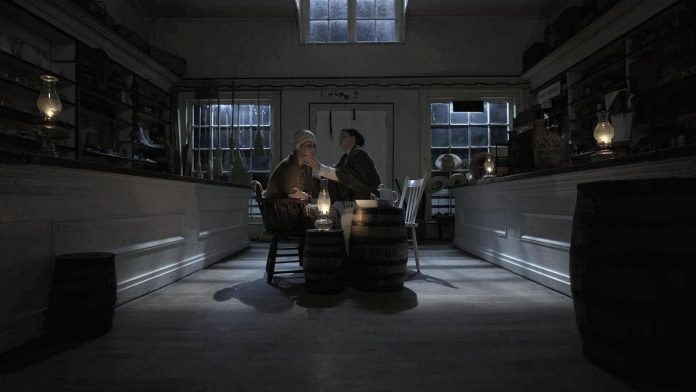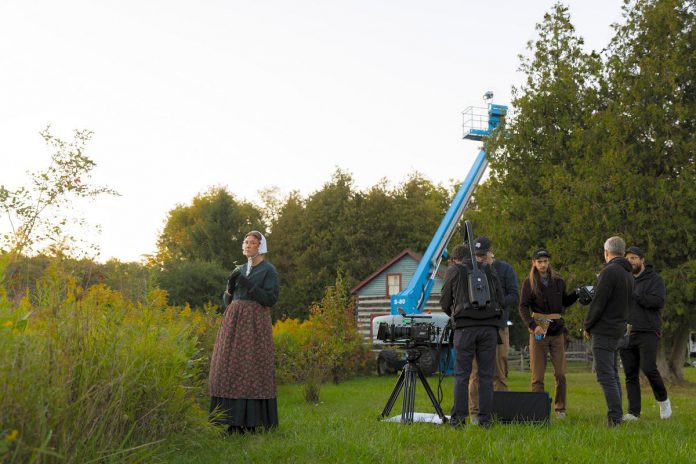
“2024 is going be great year for filmmaking and for the future of filmmaking in Peterborough.”
So declares cinematographer Pawel Dwulit, who has teamed up with local production professionals to launch a project that aims to introduce Peterborough and the Kawarthas as a filming destination.
For both visiting production companies and for those looking to produce locally, the Peterborough Kawartha Film Office will make it easier for all types of productions to come to the region by providing assistance with locations, permits, crews, equipment rental, and other support services.
“We should be marketing both regions, Kawarthas and Peterborough, under one lens because of the amazing variety of locations we have and creative people we have,” says Dwulit, pun fully intended. “We are trying to help build the pipeline that needs to exist so that the region can be marketed better.”
Dwulit is the owner of Paradigm Pictures, a production company specializing in TV commercials, documentaries, and narrative films. Established in 2013 though branded as Paradigm in 2019, the company is a collective of filmmakers and creatives across different roles in production including agencies, brands, and artists.
“I just love creating ecosystems for other ideas to be born,” says Dwulit. “That’s happening with the film office, and the more we get it out there, the more positive reactions we get.”
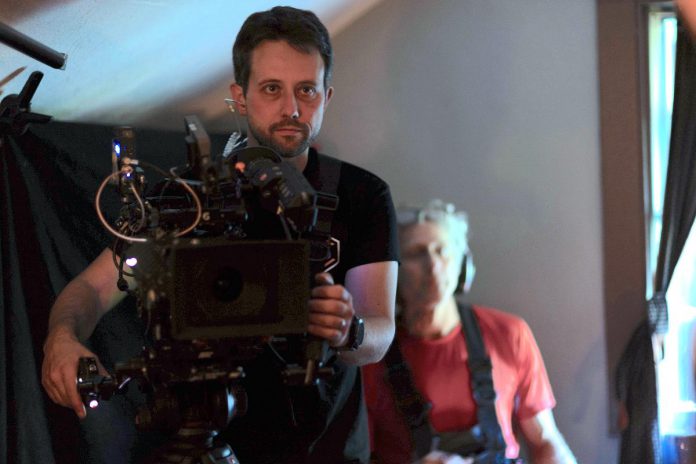
The concept of the film office came out of “necessity” explains Dwulit, who just wrapped up filming a proof of concept for a three-part mini-series called Grist, which was written, produced, filmed, and edited in Peterborough County.
While filming at Lang Pioneer Village in Keene, Dwulit, who is director of photography and co-director, thought about how a central film hub would provide a lot of benefit and opportunity for the “talented” crew he had been working alongside.
“There’s a huge pendulum shift now away from the giant studios — from the big Marvel movies — to good storytelling that impacts you and makes you think about people, life, and humanity — we have all that here,” says Dwulit. “At the core is good storytelling and there’s huge potential for that in this region.”
Dwulit adds that while there are already big features being filmed in Peterborough — including an episode from Star Trek: Strange New Worlds at The Mount Community Centre — the region’s full potential is not being realized.
“That kind of production brings a lot of money locally to all kinds of businesses, but there’s no one marketing plan designed around making it easier for all types of productions to come to the region,” he says.
Local industry professionals have already shown support for the project, including award-winning editor and producer Rob Viscardis, filmmakers Michael Hayes, Drew Antzis, and Brendan Fell, actress Tamara Bick, actor and improv comedian Adam Martignetti, and musician SJ Riley, among others who were involved in the hyperlocal production of Grist.

The development of the not-for-profit film office is currently in the first of a three-phase plan to span the next three to four years. Currently in the first stage, the team is curating a list of locations that are willing to be rented out for film production. All locations are welcome to get involved, from bowling alleys to restaurants and event venues to cottages. Other talent and service providers, like visual effects and makeup artists, will also be in the database.
“We’re going to have a whole slew of vendors that have been pre-vetted and pre-approved by the film office,” explains Dwulit. “If someone wants some sort of service, they want to go to one place and find somebody that’s trusted to give them that level of service.”
The cinematographer explains the database would not only encourage the growth of the local film community, but the business itself would generate a new revenue stream.
“It’s the same idea as being listed in a directory,” he says, noting that there’s potential for the spaces to be rented even outside of film for things like content creation. “It promotes your business as well, and the rates can always be negotiated, or they it can be offered in exchange for product placements.”
Once a thorough list of participating locations has been gathered, the next phase will involve the collection of data for each service. All relevant data including rental rates and permits will be recorded, and 360-degree photos of the location will be taken. This will make it easier to scout suitable locations.
“For example, you want to be able to say ‘I need a 20-by-20-foot room with big windows facing east, unobstructed for light.’ How many of those exist? I don’t know, but hopefully once we have the database all put together, you can search for something like that. We want to make it as detailed as possible.”
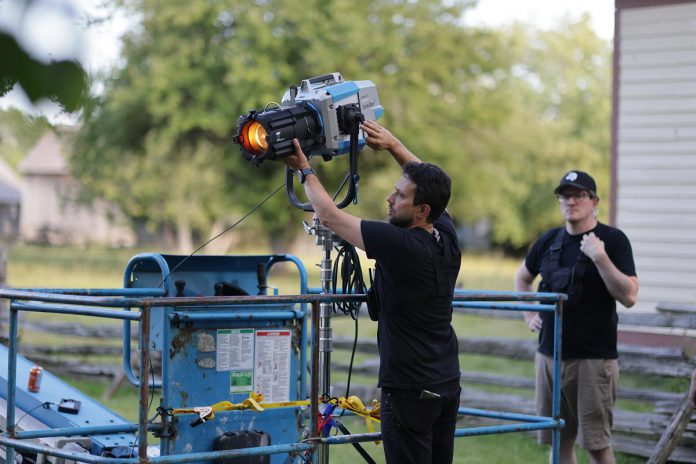
In the effort to provide learning opportunities, which is another goal of the hub, Fleming marketing and business students will begin building the website database in the spring. By September 2024, the aim is for the film office to have secured the necessary grants and economic development support to have completed phase two with the fully formed database.
Also by September, Dwulit is hopeful that Paradigm Pictures will be in the process of filming their first holiday film. The production company has partnered with Peterborough-based screenwriter Carley Smale, who has already written more than a dozen holiday feature films and wants to create one that is hyperlocal.
The third phase of the project will involve the creation of a virtual production stage (a wrap-around screen with ceiling panels that can display any environment) right here in the Kawarthas. The stage would be commercially rentable and allow for crews to be “in multiple places in a short amount of time” explains Dwulit.
“This would round out the service offerings in terms of production,” Dwulit explains. “You won’t have to drive to Toronto to rent. You can rent from us here locally.”
He adds that, like the film office database, the virtual production stage will create more capacity for learning opportunities “at various levels” right here in the community.
“We could have a smaller production, a local production from Peterborough, or a marketing agency come in and use this stage, and not only educate their team but have a much higher level of production quality,” he says. “We want to bring in people from the community at heavily reduced rates so they can learn. We want to make it accessible — the gates aren’t up, and the chains aren’t on them.”
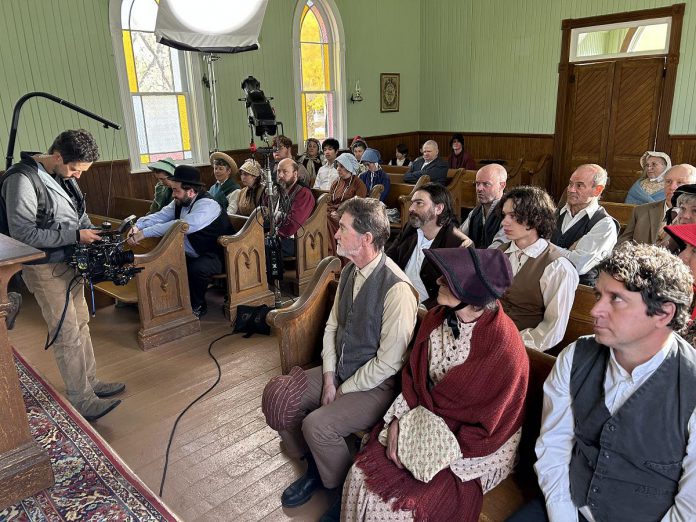
While the virtual production stage may still be years out, Dwulit assures that the educational opportunities, creative education advancements, and economic growth are all happening much sooner.
“The aim is to help the region and those interested in film be the best that they can be at this time where we are, and this whole pipeline is going to make that happen,” he says. “It’s the obvious thing to be doing right now in order to establish more economic interest in the region.”
Visit ptboklfilmoffice.com for more information on the Peterborough Kawartha Film Office and follow them on Instagram and to stay up to date on film projects.
